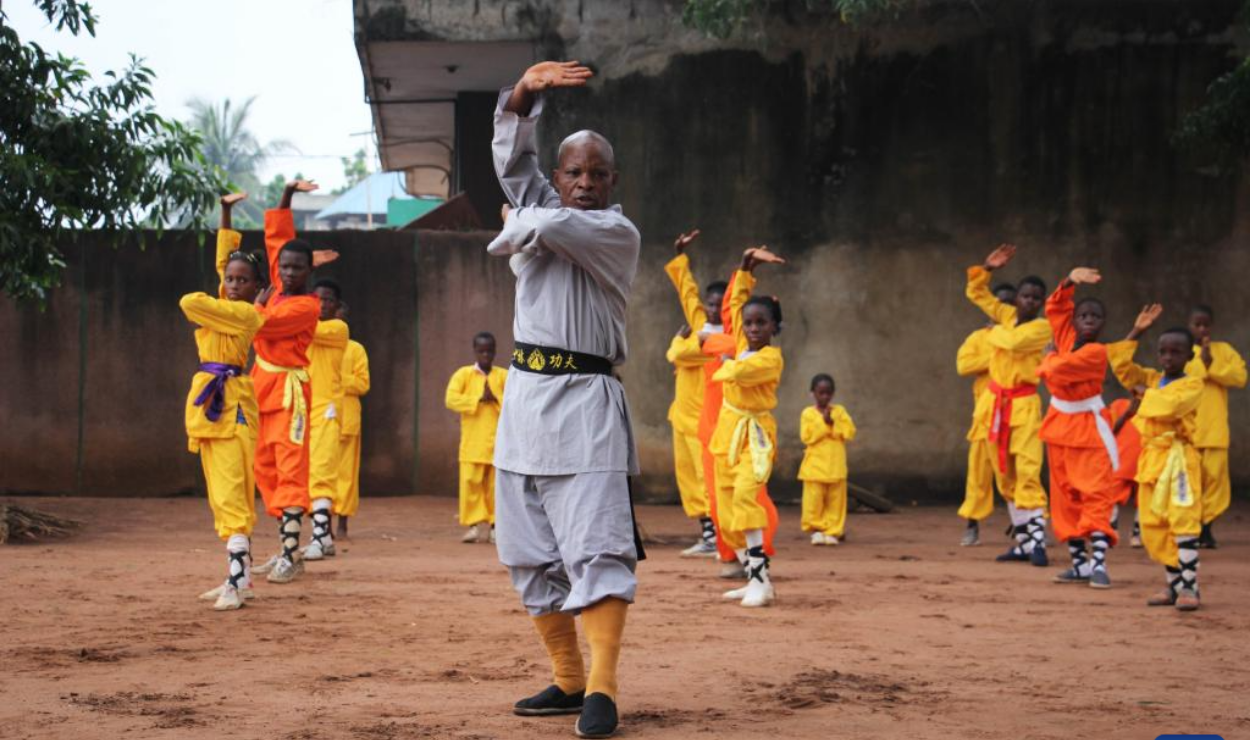In a small town called Akpro-Misserete, about 40 kilometers from Cotonou, the economic capital of Benin (贝宁共和国), there is a lively martial arts club. Here, 53-year-old Damien Agossou Degbo leads his students in practicing kung fu and tai chi under the warm sun. For Degbo, Chinese martial arts are more than just exercise — they are a bridge connecting his country, Benin, with China’s rich culture.
Degbo’s story began at the age of 13. When he was a student in Dangbo town, he watched Chinese martial arts movies. Films with stars like Bruce Lee and Jackie Chan aroused his interest in Chinese culture. “I was amazed by how the actors fought with both grace and strength,” he said. This love led him to join a kung fu club in Porto-Novo. In 2009, he started learning Chinese language and culture at a cultural center in Cotonou. By 2010, he opened his own club, called “Super Shaolin of Benin”.
In 2014, Degbo’s dream came true: he won a scholarship to train at the Shaolin Temple in China’s Henan Province. The three-month training was very tough. “In Benin, we practiced 3-4 times a week,” he said. “While at Shaolin, it was a way of life.” But the experience was amazing. He learned not only martial arts but also calligraphy, tea ceremonies, and even traditional Chinese medicine. The experience offered him a deep and immersive introduction to Chinese culture. A year later, Degbo went to China again to study traditional performance arts, including lion and dragon dances.
After returning to Benin, Degbo wanted to share everything he learned. He taught his students not just wushu and tai chi but also lion dances and tea ceremonies. Today, his club has over 350 students across Benin. “I wanted to pass on what I had learned to empower young people with self-discipline, confidence and an understanding of another culture,” he said. Through his club, Degbo has turned his love for Chinese martial arts into a way to bring people together and spread cultural understanding.
原创编写 版权所有 侵权必究! 每日更新 个性化阅读 英语飙升!
1.1. What first sparked Degbo’s interest in Chinese culture?
A Chinese action movies.
B A martial arts club.
C Shaolin training.
D Calligraphy classes.
解析:选A。细节理解题。根据第二段的“When he was a student in Dangbo town, he watched Chinese martial arts movies. Films with stars like Bruce Lee and Jackie Chan aroused his interest in Chinese culture.”可知,德格博13岁时观看李小龙和成龙等的中国功夫电影,这引发了他对中国文化的兴趣。故选A。
2.2. Which word best describes Degbo’s training at the Shaolin Temple?
A Relaxing.
B Disappointing.
C Demanding.
D Meaningless.
解析:选C。推理判断题。根据第三段的“The three-month training was very tough.”和“While at Shaolin, it was a way of life.”可知,2014年,德格博到河南少林寺参加训练,三个月的训练非常艰苦。在少林寺,训练就是一种生活方式。由此可知,他在少林寺的训练是艰苦/费时费力的。故选C。
3.3. What did Degbo learn during his second trip to China?
A Kung fu basics.
B Traditional performance arts.
C Chinese Medical skills.
D Business management.
解析:选B。细节理解题。第三段末句指出“A year later, Degbo went to China again to study traditional performance arts”一年后,德格博再次来到中国学习传统表演艺术,包括舞狮和舞龙。故选B。
4.4. What is the main purpose of Degbo’s club?
A To train professional fighters.
B To generate profits.
C To attract tourists.
D To promote cultural exchange.
解析:选D。推理判断题。根据最后一段的“Through his club, Degbo has turned his love for Chinese martial arts into a way to bring people together and spread cultural understanding.”可知,德格博通过武术俱乐部传播中国文化,即俱乐部的核心目的是促进文化交流(promote cultural exchange)。故选D。
